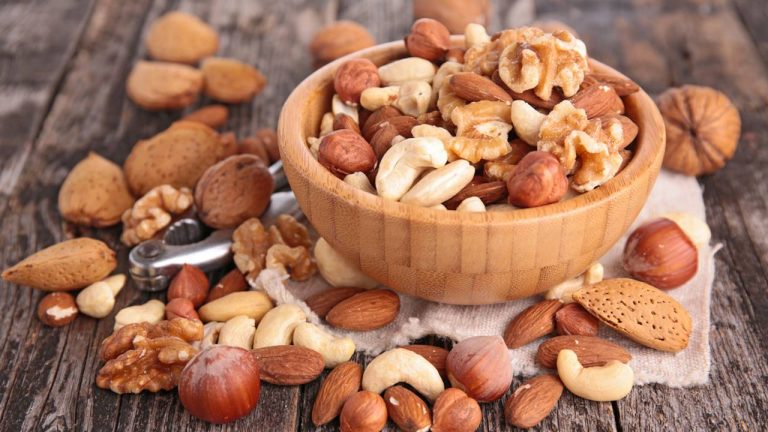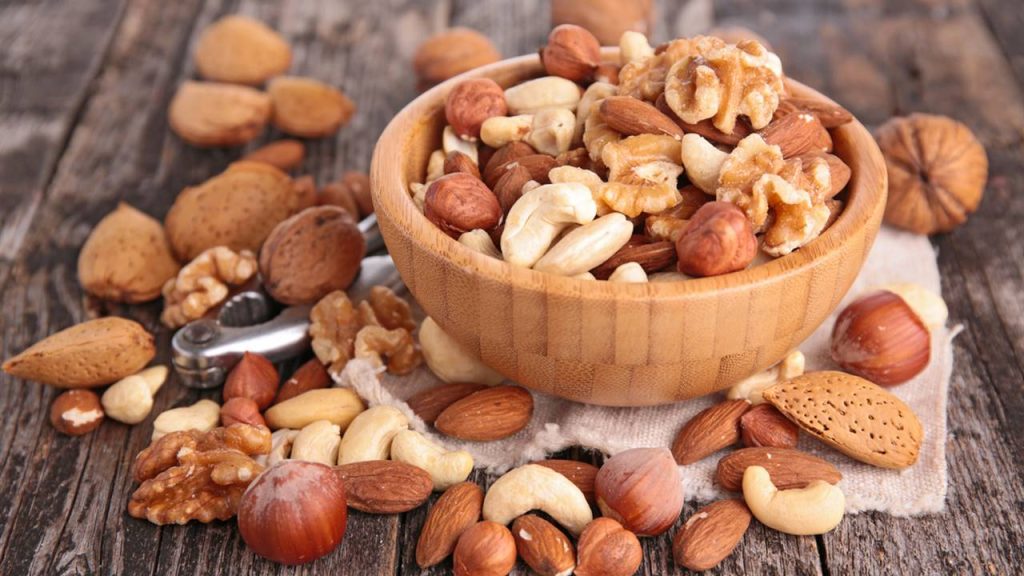
Dried fructose are seeds that concentrate essential nutrients for the life of the future plant: a very caloric but very valuable source of nutrients.
Nuts are one of the most nutritious foods out there. When analyzing their nutritional profile, the fact that, being foods with low water content, they have a high nutritional and energy density stands out. So, are nuts fattening?

- How many calories do nuts have? After vegetable oils, nuts rank second on the list of foods with the most calories, hovering around 600 per 100 g, most of them due to their fat content, which ranges from 50-60 g / 100 g. However, due to its nutritional characteristics, some experts have even proposed that a serving of nuts be taken one to five times a week.
- How many nuts should I take? The limits of its consumption are largely imposed by its significant fat content and its high energy intake. Taking into account these factors, it is considered that the standard servings of nuts should be between 25 and 30 g, not taking more than one serving per day, up to three times a week.
- So, are nuts fattening? Indeed, they are caloric, so they do not agree in hypocaloric diets. However, taking a serving of nuts – respecting the recommended amount – is a great option as a healthy snack, for example, because its nutritional qualities are exceptional.
CALORIES FROM NUTS
If you are worried about the number of calories that nuts can give you, you can choose the least caloric varieties, although there are no major differences between them:
- Nuts with more calories: Macadamaia nuts, pecans, pine nuts, hazelnuts.
- Nuts with fewer calories: Cashews, peanuts, sesame, sunflower seeds, pistachios.
Here is a list of nuts, their calories and their nutritional characteristics:
| PER 30 G OF FEED | CALORIES (KCAL) | PROTEINS (G) | FAT (G) | MINERALS (PERCENTAGE OF AN ADULT’S DAILY NEEDS) |
| Almond | 180 | 6 | 16 | Vit. E: 63%. Phosphorus: 17%. Magnesium: 16%. Vit. B2: 12%. Manganese: 11%. |
| Cashew | 170 | 5 | 14 | Magnesium: 27% Phosphorus: 22%. Iron: 14%. B1: 12% Selenium: 10% |
| Hazelnut | 193 | 4 | 18 | Vit. E 67%. Manganese: 34%. Magnesium: 14%. Phosphorus: 12%. Vit. B1: 11 %. |
| Peanut | 171 | 8 | 14 | Vit. B3: 27% Vit. B1: 26%. Vit. E: 26%. Magnesium: 15%. Phosphorus: 14%. |
| Pumpkin (pipes) | 162 | 7 | 14 | Magnesium: 50%. Phosphorus: 44%. Iron: 31%. Manganese: 18%. Vit. E: 14%. |
| Dried coconut | 182 | 2 | 19 | Vit. B2: 1 2% Magnesium: 9%. Iron: 7%. |
| Sunflower (pipes) | 175 | 8 | 15 | Vit. E: 55%. Vit. B1: 48%. Magnesium: 36% Phosphorus: 23%. Iron: 18% |
| Macadamia | 215 | 2 | 23 | Magnesium: 12%. Vit. B1: 35%. Phosphorus: 7%. |
| Nut | 200 | 5 | 17 | Vit. E: 31 %. Fluoride: 21%. Vit. B6: 16%. Phosphorus: 15%. Magnesium: 13% |
| Brazil nut | 197 | 4 | 20 | Vit. B1: 29%. Phosphorus: 23% Magnesium: 21%. |
| Pecan | 207 | 3 | 22 | Vit. B1: 19%. Magnesium: 11%. Phosphorus: 10%. E: 10%. |
| Pinion | 202 | 4 | 18 | Vit. B1: 38%. Phosphorus: 23%. Iron: 11%. |
| Pistachio | 179 | 6 | 15 | Vit. B6: 30%. Vit. B1: 19%. Phosphorus: 19%. Iron: 15%. Magnesium: 15%. |
| Sesame | 171 | 6 | 15 | Magnesium: 30%. Calcium: 29%. Iron: 25%. Vit. B1: 25%. Vit. E: 14%. |
NUTS: IS IT FATTENING TO TAKE A SERVING AS A SNACK OR BREAKFAST?
In general, if we respect the recommended portions, nuts do not get fat if they are eaten, three times a week (as a snack or at breakfast). Doing so not only does not make us fat, but benefits our health. And it is that nuts have many healthy properties:
- They provide quality fats. Although the amount of fats provided by nuts is usually the reason for rejection among some consumers, the truth is that behind it hides one of its main virtues: the quality of its fats. They contain plant sterols, or phytosterols, which reduce the degree of absorption of cholesterol present in the small intestine and that comes, above all, from bile secretion and the disintegration of the desquamated cells of the intestinal epithelium. In these there is a clear predominance of unsaturated or heart-healthy fats, since their consumption is associated with a decrease in cholesterol levels.
- Rich in protein. Beyond fats, its protein content stands out, which is between 15 and 30% of its weight depending on the varieties. These are remarkable amounts because, for example, peanuts and sunflower provide more protein than meat, and almonds match it; However, it should be noted that, even in the case of good quality proteins, these do not reach that of foods of animal origin, whose amino acid composition is closer to our needs.
- High arginine content. They also highlight their high levels of arginine, especially in walnuts, since this amino acid participates in the formation of nitric oxide, a vasodilator that also reduces the aggregation of platelets in the arteries.
- Rich in minerals and vitamins. Regarding the former, they can be considered an excellent source of magnesium, iron, calcium and zinc, elements that are scarce in our refined diets.
- Richness of vitamins. Among the vitamins, the presence in some nuts (sunflower, almond, hazelnut, walnut …), of vitamin E, of antioxidant and arterial protective effect, stands out.
- High antioxidant content. Norwegian and American researchers, after analyzing all the varieties, pointed out that walnuts are the richest in antioxidants and that, therefore, they can prevent cardiovascular diseases and protect the body from the action of free radicals, reducing their toxic effect
- They provide nutrients of high biological value. Nuts provide significant amounts of protein and iron, two of the star nutrients of meat and fish, and can contribute significantly to the coverage of their nutritional needs. It is therefore advisable to have them.
IS IT GOOD TO EAT NUTS?
You have already seen that the nutritional properties of nuts are exceptional, so, in general, the consumption of nuts benefits everyone, except for contraindications.
- When are nuts especially advised? In particular, they are suitable for those with high nutritional needs, such as children, adolescents, pregnant and lactating women and people with a high degree of physical activity. It is best to eat them raw, because their nutrients are preserved intact, and to avoid excessive salt consumption.
- When are nuts discouraged? When you have delicate digestions, if you are not interested in eating fiber or follow a hypocaloric diet and, of course, in case of allergy to this type of food, whose incidence begins to be frequent within food allergies. In this case it is also necessary to avoid all products containing nuts. In some cases, it is necessary to modify its texture, whether there are teething problems, especially in the case of the elderly, or if you want to prepare “milks” or vegetable drinks with them.
- Is coconut a recommended nut? Coconut is a slightly different nut. It has a particular profile of fatty acids, since 100 g of coconut contains 36.5 g of fats and of these 32 g correspond to saturated fats. Its oil, along with palm, is used in pastry products and pastries. With coconut it is shown that vegetable fat is not always synonymous with healthy fat.